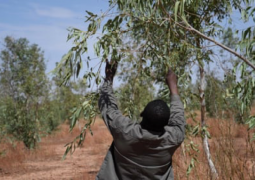Autism is a victim of such thoughtless judgments and continues to be a disability that a large population of The Gambia often mistakes for mental instability, builds stigmas around, and overlooks for lack of better understanding and in-depth sensitization. It remains something of a novelty among the mass, not completely unknown but not as acknowledged as it needs to be, leaving people who suffer from it alone and lacking the help and reassurance that they need to be nurtured into high-functioning members of society.
The spectrum disorder affects 82 out of every 10,000 births in the country and 394.95 out of every 100,000, ranking The Gambia as the 61st most affected nation out of 198 countries. These are not mild numbers by any chance and paint a simple picture that the dedication to mastering autism as a relevant concern affecting unsuspecting children and parents must skyrocket and materialize into impactful efforts.
To comprehend what it is, autism spectrum disorder is a neurological and developmental disability that affects verbal communication like having the ability to speak, develop language skills, and understand everyday dialogue, as well as non-verbal communication, like having trouble interpreting facial expressions, tone of voice, and body language.
It also ushers in challenges such as having obsessive interests (like being extremely focused on a particular thing, it could be numbers or art), repetitive behaviors (like repeating the same phrase over and over again no matter what is being said to them, suffering intolerable resistance to change because they love familiarity and predictable routines, throwing tantrums over meager things because of their sensory sensitivity and displaying a constant need to be alone. Thus, in many instances where parents have the notion that their child is just going through a slow development process or is being shy or naughty because they refuse to talk or interact with other children, autism may very well be the case.
However, because autism is a spectrum disorder, each autistic person has a distinct set of strengths and challenges that they face. This is to say that how they learn and think can differ from highly-skilled (which is high-functioning autism, also known as Asperger’s syndrome where the child is quite verbally and intellectually adept), to severely challenged (which is low-functioning autism where the child is mostly unresponsive), which is why while some of them might require significant assistance in their daily lives, others may need less support and in most cases go on to live entirely independent lives.
With a ratio of 3:1, autism is more likely to be found in a male child than a female child with the average age for diagnosis at 4 years and the earliest at 18 months old, although in cases where the child has high-functioning autism parents may fail to detect any symptoms until they reach a stage where they are teenagers interacting with peers and displaying a ridiculous amount of fear for social situations.
When toddlers start parading aggressive behavior because things aren’t going their way, when they are withdrawn from their surroundings because they have difficulty detecting and responding to other people’s emotions accordingly, and other indicators such as failing to respond to their names, limited or no eye contact, and absence of social curiosity during interactions are all symptoms that should be observed with utmost dedication and immediately discussed with a pediatrician upon discovery.
Being that the cause of autism is unfounded, researchers have widely speculated that It can be a genetic factor, but usually, this genetic factor is not strong enough to be the primary cause of it, thus quite often, autism can be attributed to environmental factors as well. It can happen to a child in a situation where both parents were old at the time of conception, it can be an illness that the mother might have suffered while pregnant or complications during delivery where the child lacked oxygen for an extended period. As a result of this, there is no determined cure, hence seeing an expert upon initial detection makes way for early intervention that grants the child the opportunity to be raised in an autistic-friendly environment where their strengths are harvested and their weaknesses are molded into better versions, allowing them to grow entirely independent or less dependent than they initially were.
It is at our earliest convenience that shame culture is annihilated when it comes to matters as such, autism is not something that asks for your child to be treated as anything less than normal, they grow just like any other child, and their brain functions just like any other child, they simply just need to be cared for and treated in a way that is in tune with what their brain can sustain at that given time. Research has shown that both Albert Einstein and Isaac Newton displayed autistic tendencies and these are two of the greatest minds the world has ever seen. Elon Musk, one of the wealthiest people in the world is autistic. What this goes to show is that what people with autism spectrum disorder need are families who support and understand them and a community that refrains from shaming them and are instead open to learning about disabilities and making accommodations.
To prance where it glows, things began looking up for the autistic community when the Gambia Association for Autism and Developmental Disabilities (GAADD) was founded in 2018 by Gambian parents of an autistic child. Seeing as those who suffer from the condition seek support and have little to no options, GAADD was established as a non-profit organization to help guide, support, and educate Gambians about the neurological condition. By 2021 they started offering pilot classes to give out lessons to autistic children according to their development level. There is still a mountain to climb when it comes to keeping the country’s population aware of autism, but the birth and work of organizations as such is a huge stepping stone to making a difference because there is now a place where voices are heard and challenges are eased.
While well-rounded awareness is achieved with small careful steps, it goes without saying that a starting point would be to cease associating conditions like autism, epilepsy, down syndrome, and such with exaggerated myths and insidious entities leading both child and parent to swim in shame and the belief that there is something inherently wrong that can’t be fixed. Take small steps towards practicing awareness and inclusion so that our fragile youth are protected and cared for in the right way, with the right measures.
Read Other Articles In Feature




